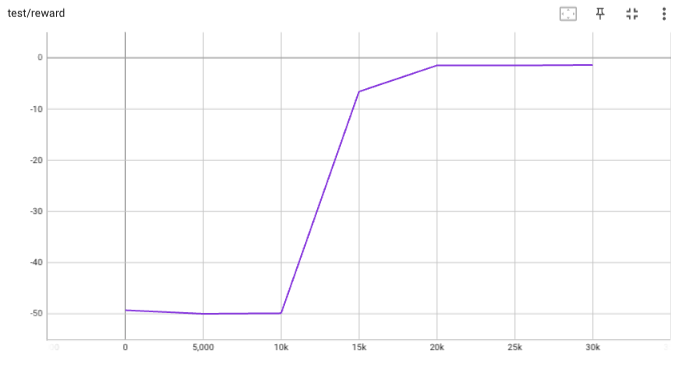IMHO, unit tests, compared with integration tests or end-to-end tests or
other tests, often means something that only tests a single
method/function/class/etc, and often has a lot of stubs and mocks so it
is far from a typical/real usage scenario. On the other hand,
integration tests or e2e tests mock less and are more like the real
case.
Tianshou says:
> ... tests include the full agent training procedure for all of the
implemented algorithms
It seems that this is more than unit test, and falls into the category
of integration or even e2e tests.
## implementation
I implemented HER solely as a replay buffer. It is done by temporarily
directly re-writing transitions storage (`self._meta`) during the
`sample_indices()` call. The original transitions are cached and will be
restored at the beginning of the next sampling or when other methods is
called. This will make sure that. for example, n-step return calculation
can be done without altering the policy.
There is also a problem with the original indices sampling. The sampled
indices are not guaranteed to be from different episodes. So I decided
to perform re-writing based on the episode. This guarantees that the
sampled transitions from the same episode will have the same re-written
goal. This also make the re-writing ratio calculation slightly differ
from the paper, but it won't be too different if there are many episodes
in the buffer.
In the current commit, HER replay buffer only support 'future' strategy
and online sampling. This is the best of HER in term of performance and
memory efficiency.
I also add a few more convenient replay buffers
(`HERVectorReplayBuffer`, `HERReplayBufferManager`), test env
(`MyGoalEnv`), gym wrapper (`TruncatedAsTerminated`), unit tests, and a
simple example (examples/offline/fetch_her_ddpg.py).
## verification
I have added unit tests for almost everything I have implemented.
HER replay buffer was also tested using DDPG on [`FetchReach-v3`
env](https://github.com/Farama-Foundation/Gymnasium-Robotics). I used
default DDPG parameters from mujoco example and didn't tune anything
further to get this good result! (train script:
examples/offline/fetch_her_ddpg.py).

- This PR adds the checks that are defined in the Makefile as pre-commit
hooks.
- Hopefully, the checks are equivalent to those from the Makefile, but I
can't guarantee it.
- CI remains as it is.
- As I pointed out on discord, I experienced some conflicts between
flake8 and yapf, so it might be better to transition to some other
combination (e.g. black).
* Changes to support Gym 0.26.0
* Replace map by simpler list comprehension
* Use syntax that is compatible with python 3.7
* Format code
* Fix environment seeding in test environment, fix buffer_profile test
* Remove self.seed() from __init__
* Fix random number generation
* Fix throughput tests
* Fix tests
* Removed done field from Buffer, fixed throughput test, turned off wandb, fixed formatting, fixed type hints, allow preprocessing_fn with truncated and terminated arguments, updated docstrings
* fix lint
* fix
* fix import
* fix
* fix mypy
* pytest --ignore='test/3rd_party'
* Use correct step API in _SetAttrWrapper
* Format
* Fix mypy
* Format
* Fix pydocstyle.
fixes some deprecation warnings due to new changes in gym version 0.23:
- use `env.np_random.integers` instead of `env.np_random.randint`
- support `seed` and `return_info` arguments for reset (addresses https://github.com/thu-ml/tianshou/issues/605)
* When clip_loss_grad=True is passed, Huber loss is used instead of the MSE loss.
* Made the argument's name more descriptive;
* Replaced the smooth L1 loss with the Huber loss, which has an identical form to the default parametrization, but seems to be better known in this context;
* Added a fuller description to the docstring;
- A DummyTqdm class added to utils: it replicates the interface used by trainers, but does not show the progress bar;
- Added a show_progress argument to the base trainer: when show_progress == True, dummy_tqdm is used in place of tqdm.
The new proposed feature is to have trainers as generators.
The usage pattern is:
```python
trainer = OnPolicyTrainer(...)
for epoch, epoch_stat, info in trainer:
print(f"Epoch: {epoch}")
print(epoch_stat)
print(info)
do_something_with_policy()
query_something_about_policy()
make_a_plot_with(epoch_stat)
display(info)
```
- epoch int: the epoch number
- epoch_stat dict: a large collection of metrics of the current epoch, including stat
- info dict: the usual dict out of the non-generator version of the trainer
You can even iterate on several different trainers at the same time:
```python
trainer1 = OnPolicyTrainer(...)
trainer2 = OnPolicyTrainer(...)
for result1, result2, ... in zip(trainer1, trainer2, ...):
compare_results(result1, result2, ...)
```
Co-authored-by: Jiayi Weng <trinkle23897@gmail.com>
(Issue #512) Random start in Collector sample actions from the action space, while policies output action in a range (typically [-1, 1]) and map action to the action space. The buffer only stores unmapped actions, so the actions randomly initialized are not correct when the action range is not [-1, 1]. This may influence policy learning and particularly model learning in model-based methods.
This PR fixes it by adding an inverse operation before adding random initial actions to the buffer.
add imitation baselines for offline RL; make the choice of env/task and D4RL dataset explicit; on expert datasets, IL easily outperforms; after reading the D4RL paper, I'll rerun the exps on medium data